Emperor Gaozu of Han
| Liu Bang | |
|---|---|
 A portrait of Emperor Gaozu in Sancai Tuhui. | |
| Emperor of the Han dynasty | |
| Born |
256 BC[1] or 247 BC[2] Feng Town, Pei County, State of Chu[3] |
| Died |
1 June 195 BC (aged c. 60-61 / c. 51–52) Chang'an, Han Empire |
| Reign | 28 February 202 BC[4] – 1 June 195 BC |
| Successor | Liu Ying |
| Names | |
| Traditional Chinese | 劉邦 |
| Simplified Chinese | 刘邦 |
| Pinyin | Liú Bāng |
| Wade–Giles | Liu Pang |
| Courtesy name | Ji (Chinese: 季; pinyin: Jì; Wade–Giles: Chi) |
| Posthumous name | Emperor Gaozu (Chinese: 高皇帝; pinyin: Gāo Huángdì; Wade–Giles: Kao Huang-ti) |
| Temple name |
Taizu (Chinese: 太祖; pinyin: Tàizǔ; Wade–Giles: Tai-tsu)[5] Gaozu (Chinese: 高祖; pinyin: Gāozǔ; Wade–Giles: Kao-tsu)[6] |
| Emperor Gaozu of Han | |||||||||||||||||||||||||
| Traditional Chinese | 漢高祖 | ||||||||||||||||||||||||
|---|---|---|---|---|---|---|---|---|---|---|---|---|---|---|---|---|---|---|---|---|---|---|---|---|---|
| Simplified Chinese | 汉高祖 | ||||||||||||||||||||||||
| Literal meaning | High Ancestor of Han | ||||||||||||||||||||||||
| |||||||||||||||||||||||||
| Liu Bang (personal name) | |||||||||||||||||||||||||
| Simplified Chinese | 刘邦 | ||||||||||||||||||||||||
| |||||||||||||||||||||||||
Emperor Gaozu of Han (Chinese: 漢高祖; 256 BC – June 1, 195 BC), born Liu Bang (Chinese: 劉邦), was the founder and first emperor of the Han dynasty, reigning from 202 – 195 BC. He was one of the few dynasty founders in Chinese history with humble origin from the peasant class.
Before coming to power, Liu Bang initially served as a minor patrol officer for the Qin dynasty in his hometown Pei County, within the conquered state of Chu. With the First Emperor's death and the Qin Empire's subsequent political chaos, Liu Bang renounced his government position and became an anti-Qin rebel leader. He won the race against fellow rebel leader Xiang Yu to invade the Qin heartland and forced the surrender of the last Qin emperor in 206 BC.
After the fall of the Qin, Xiang Yu, as the de facto chief of the rebel forces, divided the former Qin Empire into the Eighteen Kingdoms, and Liu Bang was forced to accept the poor and remote Bashu region (parts of present-day Sichuan and Chongqing) under the title "King of Han" (Chinese: 漢王; pinyin: Hàn Wáng). Within the year, Liu Bang broke out with his army and conquered the Three Qins, starting a civil war known as the Chu–Han Contention for supremacy over China. In 202 BC, Liu Bang emerged victorious following the Battle of Gaixia, unified most of China under his control, and established the Han dynasty with himself as the founding emperor.
During his reign, Liu Bang reduced taxes and corvée, promoted Confucianism, and suppressed revolts by the lords of non-Liu vassal states, among other actions. He also initiated the policy of heqin to maintain a de jure peace between the Han Empire and the Xiongnu after losing the Battle of Baideng in 200 BC. He died in 195 BC and was succeeded by his son, Liu Ying.
Birth and early life
In imperial Han myth, Liu Bang was a descendant of the mythical Emperor Yao, who descended from the Yellow Emperor.[7] It is a common practice among many ancient Chinese noble families to claim descent from the mythical Yellow Emperor, in order to proclaim divine ruling legitimacy.[8]
Liu Bang was born to a peasant family in Fenyu Village (枌榆社), Zhongyang Township (中陽里), Feng County (豐邑) from the state of Chu during the late years of the Warring States period. His parents' names were not recorded in history; they were simply referred to as "Liu Taigong" (劉太公; lit. "Old Sir Liu") and "Liu Ao" (劉媼;[9] lit. "Old Madam Liu"). According to legend, before Liu Bang's birth, his mother was caught in a rainstorm and took shelter under a bridge. At that moment, lightning struck and the sky darkened. Liu Bang's father went to fetch his wife home and saw a dragon hovering above her. She became pregnant and later gave birth to Liu Bang.[10]
The young Liu Bang was outspoken, charismatic and of great generosity and forbearance. However, he enjoyed loafing, disliked reading, showed no interest in farming and manual labour and frequently ran into trouble with the law, hence his father often called him a "little rascal" for his lazy lifestyle. Liu Bang persisted in his idling ways and depended on his brother's family for food and lodging. When he grew older, he became a good friend and live-in companion of a former retainer of Lord Xinling named Zhang Er (Chinese: 張耳, ? — 202 BC), who was the magistrate of the nearby Waihuang County at the time.
After Qin dynasty conquered Chu, Zhang Er went into hiding, and Liu Bang returned to his own hometown. He was later recommended and appointed as the local sheriff at Sishui Pavilion (泗水亭) in the neighbouring Pei County, working under the supervision of his close friends Xiao He and Cao Shen, who often helped covering up his delinquent behaviours. He nevertheless forged close relationships with most of the local county bureaucrats, and earned himself a small reputation in the district. Liu Bang was once sent for statute labour in the capital Xianyang, and encountered the First Emperor going on an inspection tour around the nation. Awed by the majestic sight of the royal convoy, he exclaimed, "Wow, this is how a great man should be! (嗟乎,大丈夫當如此也)"
One day, Lü Wen (呂文; also called Lü Gong 呂公), a wealthy and influential gentry from Shanfu County who had recently moved to Pei County, was putting on a feast to host the local elites. Xiao He, who was in charge of helping Lü Wen collect gifts from the visitors, announced that "those who do not offer more than 1,000 coins worth of gifts shall be seated outside the hall". Liu Bang went there without bringing any money and said, "I offer 10,000 coins." Lü Wen saw Liu Bang and was so impressed with him on first sight, that he immediately stood up and welcomed Liu into the hall to sit beside him, despite Xiao He telling him that Liu Bang was not being serious. Lü Wen chatted with Liu Bang, and said, "I used to predict fortunes for many people but I have never before seen someone so exceptional like you." He then offered his daughter Lü Zhi's hand in marriage to Liu Bang. After they were wed, Lü Zhi bore Liu Bang a son Liu Ying (the future Emperor Hui) and a daughter (the future Princess Yuan of Lu).
Insurrection against the Qin dynasty
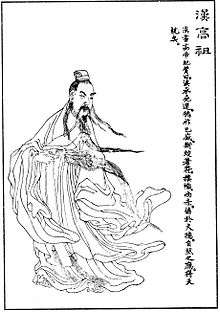
Liu Bang was tasked with escorting a group of convicts to Mount Li to build the First Emperor's mausoleum. When some prisoners escaped during the journey, Liu Bang feared for his life because allowing convicts to escape was a capital offence under Qin law. He eventually released the remaining prisoners and became a fugitive. Some of the convicts he released was so touched they joined him on their own accord.
In legend, they encountered a gigantic white serpent which killed some people with its poisonous breath. Liu Bang, while drunk, slew the serpent that night and encountered an old woman weeping by the road the next morning. When Liu Bang's men asked her why she was crying, she replied, "My child, the White Emperor's son, has been slain by the son of the Red Emperor." She then disappeared mysteriously. After hearing the old woman's strange words, Liu Bang's followers believed that Liu was destined to become a ruler in the future and became more impressed with him. This event is known as the "Uprising of the Slaying of the White Serpent" (Chinese: 斬白蛇起義).
Liu Bang and his followers took refuge on Mount Mangdang (芒碭山; in present-day Yongcheng, Shangqiu, Henan) and lived as outlaws in a stronghold there. Liu Bang still maintained secret contact with his old friends such as Xiao He and Cao Shen in Pei County. In 209 BC, Chen Sheng and Wu Guang started the Dazexiang Uprising to overthrow the Qin dynasty. The magistrate of Pei County considered joining the rebellion as well, so, acting on the advice of Xiao He and Cao Shen, he sent Fan Kuai (Liu Bang's relative) to invite Liu and his followers back to Pei County to support him. However, he changed his mind later and denied Liu Bang entry into the county. He was worried that Xiao He and Cao Shen might open the gates for Liu Bang so he intended to kill them, but Xiao and Cao escaped and joined Liu. Liu Bang followed Xiao He's suggestion and ordered his men to write letters, wrap them around arrows, and fire the arrows into the county. In the letters, he urged the townsfolk to help him. They responded to his call by killing the magistrate and welcoming him back into Pei County. Liu Bang styled himself the "Duke of Pei" (沛公) and became known to others by this title.
In 208 BC, during the reign of Qin Er Shi, the descendants of the royal families of the former Yan, Zhao, Qi and Wei states rebelled against the Qin Empire in the name of restoring their states, which were conquered by Qin in a series of wars about two decades earlier. In Wu (in present-day Jiangsu), Xiang Liang started an uprising as well and installed Xiong Xin as "King Huai the Latter" (楚後懷王) on the throne of the former Chu state. Liu Bang joined Xiang Liang and served in Chu for some time. After Xiang Liang was killed in action at the Battle of Dingtao, King Huai II sent Xiang Liang's nephew Xiang Yu and Song Yi to lead an army to reinforce the Zhao state, which was under attack by Qin forces. Liu Bang was granted the title "Marquis of Wu'an" (武安侯) by the king and tasked with leading an army to attack Qin. The king promised that whoever entered Guanzhong (the heartland of Qin) first would receive the title "King of Guanzhong". In 206 BC, Liu Bang beat Xiang Yu in the race to Guanzhong and arrived in Xianyang, the Qin capital. Ziying, the last Qin emperor, surrendered to Liu Bang and ended the Qin dynasty. Liu Bang then issued strict orders to his men, forbidding them from killing innocent civilians and pillaging the cities they conquered. Peace and stability were temporarily restored in Xianyang while Liu Bang's forces were stationed there. Xiao He also ordered all the legal documents in the Qin palace and government facilities to be collected and safely transported away.
Chu–Han Contention
Feast at Hong Gate
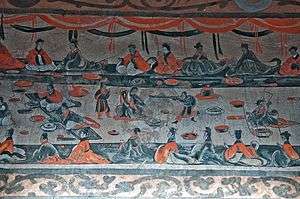
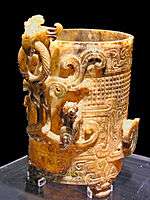
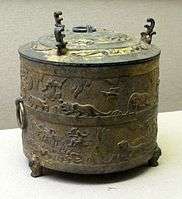
Right: a gilded bronze wine warmer with animalistic relief decorations, 26 BC, Western Han period
Xiang Yu was dissatisfied that Liu Bang had beat him in the race to Guanzhong. After instigated by his advisor Fan Zeng and Cao Wushang (曹無傷), an informer from Liu Bang's camp, he decided to set a trap to kill Liu Bang. He pretended to invite Liu Bang to a banquet, while secretly planning to assassinate Liu during the feast. However, Xiang Yu's uncle, Xiang Bo, was a close friend of Liu Bang's strategist Zhang Liang, and managed to persuade his nephew to not personally order Liu Bang's execution on the feast. Frustrated by Xiang Yu's indecisiveness, Fan Zeng then ordered Xiang Yu's cousin Xiang Zhuang to pretend performing a sword dance and use the opportunity to kill Liu Bang, but Xiang Bo volunteered to join the dance and blocked his nephew every time he thrust his sword towards Liu Bang.
Seeing Liu Bang was in mortal danger, Zhang Liang sneaked outside and summoned Liu Bang's brother-in-law and personal bodyguard Fan Kuai, who then crashed the party clad in full armor and scolded Xiang Yu for the sinister plot. Embarrassed by Fan Kuai's accusation, Xiang Yu ordered the sword dance to stop and rewarded Fan Kuai for his bravery. Liu Bang then pretended to go to the latrine and used the chance to escape Xiang Yu's camp unannounced. He and his forces then evacuated from Xianyang and retreated west. Xiang Yu led his forces into Xianyang, where they plundered and pillaged the city and burnt down the Epang Palace.
Conquest of the Three Qin
After occupying Xianyang, Xiang Yu proclaimed himself "Hegemon-King of Western Chu" and split the former Qin Empire into the Eighteen Kingdoms. The Guanzhong area, which was rightfully Liu Bang's per King Huai II's earlier promise, was given by Xiang Yu to three former Qin generals instead. Liu Bang was relocated to Hanzhong in the remote Bashu region (in present-day Sichuan) and received the title "King of Han" (漢王). When a rebellion broke out in the Qi kingdom in late 206 BC, Xiang Yu left Western Chu to suppress the revolt. Liu Bang used the opportunity to invade and conquer Guanzhong and then attack several Chu territories, including the capital Pengcheng (彭城; present-day Xuzhou, Jiangsu).
Battle of Gaixia
From 206–202 BC, Liu Bang engaged Xiang Yu in a power struggle – historically known as the Chu–Han Contention – for supremacy over China, while simultaneously attacking and subjugating the other kingdoms. In 203 BC, Xiang Yu and Liu Bang came to an armistice, known as the Treaty of Hong Canal, which divided China into east and west along the Hong Canal under the Chu and Han regimes respectively. A few months later, Liu Bang renounced the treaty and attacked Xiang Yu again. In 202 BC, Xiang Yu lost to Liu Bang at the Battle of Gaixia and committed suicide, after which Chu surrendered to Han. Liu Bang had unified much of China under his control by then.
Establishment of the Han dynasty
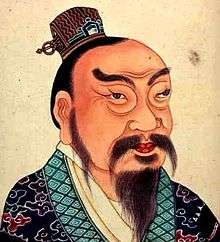
In 202 BC, Liu Bang was enthroned as the emperor with support from his subjects even though he expressed reluctance to take the throne. He named his dynasty "Han", and was historically known as "Emperor Gaozu" (or "Emperor Gao"). He established the capital in Luoyang (later moved to Chang'an) and instated his official spouse Lü Zhi as the empress and their son Liu Ying as the crown prince.
The following year, Emperor Gaozu wanted to reward his subjects who had contributed to the founding of the Han Empire, but the process dragged on for a year because they could not agree on the distribution of the rewards. The emperor thought that Xiao He's contributions were the greatest, so he awarded Xiao the title "Marquis of Zan" and gave him the largest amount of food stores. Some of the others expressed objections because they thought that Xiao He was not directly involved in battle so his contributions should not be considered the greatest. Emperor Gaozu replied that Xiao He should receive the highest credit because he planned their overall strategy in the war against Xiang Yu. He named Cao Shen as the person who made the greatest contributions in battle and rewarded him and the others accordingly.
Reign
Reducing taxes and corvée
Emperor Gaozu disbanded his armies and allowed the soldiers to return home. He gave an order stating that the people who remained in Guanzhong were exempted from taxes and corvée for 12 years while those who returned to their respective native territories were exempted for six years and that the central government would provide for them for a year. He also granted freedom to those who had sold themselves into slavery to avoid hunger during the wars. In 195 BC, the emperor issued two decrees: the first officialised the lowering of taxes and corvée; the second set the amount of tribute to be paid by the vassal kings to the imperial court in the 10th month of every year. The land tax on agricultural production was reduced to a rate of 1/15 of crop yield. He also privatised the coinage.
Emphasis on Confucianism
In his early days, Emperor Gaozu disliked reading and scorned Confucianism. After becoming the emperor, he still held the same attitudes towards Confucianism as he did before until he encountered the scholar Lu Jia (or Lu Gu). Lu Gu wrote a 12-volume book, Xinyu (新語), which espoused the benefits of governing by moral virtue as opposed to using harsh and punitive laws (as it was under the Qin dynasty). Lu Gu read each volume to the emperor after he finished writing it. The emperor was deeply impressed. Under Emperor Gaozu's reign, Confucianism flourished and gradually replaced Legalism (of Qin times) as the state ideology. Confucian scholars, including Lu Gu, were recruited to serve in the government. The emperor also reformed the legal system by relaxing some laws inherited from the Qin regime and reducing the severity of certain penalties. In 196 BC, after suppressing a rebellion by Ying Bu, he passed by Shandong, the birthplace of Confucius, and personally prepared for a ceremony to pay respect to the philosopher.
Dispute over the succession
In his later years, Emperor Gaozu favored Concubine Qi and neglected Empress Lü Zhi. He thought that Liu Ying, his heir apparent (born to the empress), was too weak to be a ruler. Thus, he had the intention of replacing Liu Ying with another son, Liu Ruyi, who was born to Concubine Qi. Lü Zhi became worried, so she asked Zhang Liang to help her son maintain his position. Zhang Liang recommended four reclusive wise men, the "Four Haos of Mount Shang" (Chinese: 商山四皓; pinyin: Shāng Shān Sì Hào), to help Liu Ying.
In 195 BC, as Emperor Gaozu's health started to worsen, he desired even more to replace Liu Ying with Liu Ruyi as the crown prince. Zhang Liang tried to dissuade him but was ignored, so he retired on the excuse that he was ill. Shusun Tong (the crown prince's tutor) and Zhou Chang also strongly objected to the emperor's decision to replace Liu Ying with Liu Ruyi. Zhou Chang said, "I am not good in arguing, but I know this is not right. If Your Majesty deposes the Crown Prince, I won't follow your orders anymore."[11] Zhou Chang was outspoken but he had a stuttering problem, which made his speech very amusing. The emperor laughed. After that, the Four Haos of Mount Shang showed up in the court. Emperor Gaozu was surprised to see them because they had previously declined to join the civil service when he invited them. The four men promised to help Liu Ying in the future if he were to remain as the crown prince. The emperor was pleased to see that Liu Ying had their support so he dismissed the idea of changing his heir apparent.[12]
Military campaigns
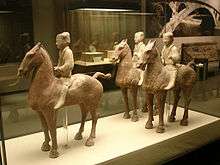
After establishing the Han dynasty, Emperor Gaozu appointed princes and vassal kings to help him govern the Han Empire and gave each of them a piece of land. There were seven vassal kings who were not related to the imperial clan: Zang Tu, the King of Yan; Hán Xin, the King of Hán; Han Xin, the King of Chu; Peng Yue, the King of Liang; Ying Bu, the King of Huainan; Zhang Er, the King of Zhao; Wu Rui, the King of Changsha. However, later, the emperor became worried that the vassal kings might rebel against him because they afterall had no blood relations with him. Han Xin and Peng Yue were (falsely) accused of treason, arrested and executed along with their families. Ying Bu and Zang Tu rebelled against him but were defeated and killed. Only Wu Rui and Zhang Er were left.
The Xiongnu in the north had been a threat since the Qin dynasty. Qin Shi Huang had sent the general Meng Tian to oversee the defences on the Qin Empire's northern border and the construction of the Great Wall to repel the invaders. Meng Tian achieved success in deterring the Xiongnu from advancing beyond the border. However, after the Qin dynasty collapsed, the Xiongnu seized the opportunity to move south and raid the border again. In 201 BC, Hán Xin (King of Hán) defected to the Xiongnu leader, Modu. In the following year, Emperor Gaozu led an army to attack the Xiongnu but was besieged and trapped by the enemy at the Battle of Baideng. Acting on Chen Ping's advice, he bribed Modu's wife with gifts and got her to ask her husband to withdraw his forces. Modu did so. After returning to the capital, Emperor Gaozu initiated the policy of heqin, which involved sending noble ladies to marry the Xiongnu leaders and paying annual tribute to the Xiongnu in exchange for peace between the Han Empire and the Xiongnu.
Death

Emperor Gaozu was wounded by a stray arrow during the campaign against Ying Bu. He became seriously ill and remained in his inner chambers for a long period of time and ordered his guards to deny entry to everyone who tried to visit him. After several days, Fan Kuai barged into the chambers to see the emperor and the other subjects followed behind him. They saw Emperor Gaozu lying on his bed and attended to by a eunuch. Fan Kuai said, "How glorious it was when Your Majesty first led us to conquer the empire and how weary we are now. Your subjects are worried when they learn that Your Majesty is ill, but Your Majesty refuses to see us and prefers the company of a eunuch instead. Has Your Majesty forgotten the incident about Zhao Gao?" The emperor laughed and got out of bed to meet his subjects.
Emperor Gaozu's health deteriorated later so Empress Lü Zhi hired a famous physician to heal him. When Emperor Gaozu enquired about his condition, the physician told him that his illness could be cured, but the emperor was displeased and he scolded the physician, "Isn't it Heaven's will that I managed to conquer this empire in simple clothing and with nothing but a sword? My life is determined by Heaven. It is useless even if Bian Que is here!" He refused to continue with the treatment and sent the physician away. Before his death, he said that Cao Shen could succeed Xiao He as the chancellor after Xiao died, and that Wang Ling could succeed Cao Shen. He also said that Wang Ling might be too young to perform his duties so Chen Ping could assist Wang, but Chen was also qualified to assume the responsibilities of a chancellor all by himself. He also named Zhou Bo as a possible candidate for the role of Grand Commandant. He died in Changle Palace (長樂宮) on 1 June 195 BC and was succeeded by Liu Ying, who became historically known as Emperor Hui.
Song of the Great Wind
The Song of the Great Wind was a song composed by Liu Bang in 195 BC when he visited his hometown in Pei County after suppressing Ying Bu's rebellion. He prepared a banquet and invited all his old friends and townsfolk to join him. After some drinks, Liu Bang played the guqin and sang the Song of the Great Wind.[13]
|
《大風歌》 |
Song of the Great Wind |
|
大風起兮雲飛揚, |
A great wind came forth, |
|
威加海內兮歸故鄉, |
Now that my might rules all within the seas, |
|
安得猛士兮守四方! |
Where will I find brave men |
Family and descendants
- Parents:
- Liu Taigong (lit. "Old Sir Liu")
- Liu Ao (lit. "Old Madam Liu")
- Siblings:
- Spouse:
- Empress Lü Zhi, bore Liu Ying and Princess Lu.
- Major concubines:
- Consort Zhang
- Consort Wei
- Consort Cao, bore Liu Fei.
- Consort Qi, bore Liu Ruyi.
- Consort Wan
- Consort Guan
- Consort Bo, bore Liu Heng.
- Consort Zhao, bore Liu Chang.
- Consort Zhao Zi'er
- Children:
- Liu Fei, Prince Daohui of Qi.
- Liu Ying, Crown Prince, later Emperor Hui.
- Liu Jian, Prince Ling of Yan.
- Liu Ruyi, Prince Yin of Zhao.
- Liu Heng, Prince of Dai, later Emperor Wen.
- Liu Hui, Prince of Liang, later Prince Gong of Zhao.
- Liu You, Prince of Huaiyang, later Prince You of Zhao.
- Liu Chang, Prince Li of Huainan.
- Princess Yuan of Lu (personal name unknown)
Modern references
Liu Bang is one of the 32 historical figures who appear as special characters in the video game Romance of the Three Kingdoms XI by Koei.
See also
| Wikiquote has quotations related to: Emperor Gaozu of Han |
| Wikimedia Commons has media related to Emperor Gaozu of Han. |
Notes and references
- ↑ This is the birth year reported by Huangfu Mi (皇甫謐) (215–282).
- ↑ This is the birth year reported by Chen Zan (臣瓚) in around 270 AD in his comments in the Book of Han.
- ↑ 李祖德 (2012). "刘邦祭祖考——兼论春秋战国以来的社会变革". 中国史研究 [Journal of Chinese Historical Studies]. CNKI. 34 (3): 11–58.
- ↑ Liu Bang already held the title "King of Han" (漢王) since March 206 BC which was given to him by Xiang Yu. Liu Bang was officially proclaimed "Emperor" on 28 February 202 BC.
- ↑ Taizu, meaning "grand ancestor", was apparently Liu Bang's original temple name because "Taizu", in ancient Chinese traditions dating back to the Shang dynasty, was the temple name of the founder of a dynasty.
- ↑ Sima Qian referred to Liu Bang as "Gaozu", meaning "high ancestor" in the Records of the Grand Historian. It is not clear why Sima Qian used "Gaozu" instead of "Taizu". Historians after Sima Qian often used "Emperor Gaozu of Han" to refer to Liu Bang. "Emperor Gaozu of Han" remains the most commonly used title to refer to Liu Bang in modern China.
- ↑ Patricia Buckley Ebrey (2003). Women and the family in Chinese history. Volume 2 of Critical Asian scholarship (illustrated ed.). Psychology Press. p. 171. ISBN 0-415-28823-1. Retrieved 4-1-2012. Check date values in:
|access-date=(help) - ↑ Fabrizio Pregadio (2008). Fabrizio Pregadio, ed. The encyclopedia of Taoism, Volume 1 (illustrated ed.). Psychology Press. p. 505. ISBN 0-7007-1200-3. Retrieved 4-1-2012. Check date values in:
|access-date=(help) - ↑ Note that the Chinese character "媼" (ǎo) was not the personal name of Liu's mother. It was used as a formal way of addressing an old woman at the time. See the dictionary definition of 媼.
- ↑ Translation of Sima Qian's Shiji.
- ↑ (臣口不能言,然臣期期知其不可。陛下雖欲廢太子,臣期期不奉詔。)
- ↑ Chi-yen Ch'en (14 July 2014). Hsun Yueh and the Mind of Late Han China: A Translation of the SHEN-CHIEN. Princeton University Press. pp. 171–. ISBN 978-1-4008-5348-9.
- ↑ (Chinese) 大风歌
- ↑ John Minford; Joseph S. M. Lau (2000). Minford, John, ed. An Anthology of Translations Classical Chinese Literature Volume I: From Antiquity To The Tang Dynasty. Columbia University Press. p. 415. ISBN 978-0-231-09676-8.
- Needham, Joseph (1986). Science and Civilization in China: Volume 4, Part 2. Taipei: Caves Books, Ltd.
- Sima Qian. Records of the Grand Historian, Volume 8.
- Ban Gu et al. Book of Han, Volume 1.
External links
- Emperor Gaozu at Chinaculture.org
| Emperor Gaozu of Han Born: 256 BC Died: 1 June 195 BC | ||
| Regnal titles | ||
|---|---|---|
| New title | King of Han 206 BC – 202 BC |
Merged in the Crown |
| Preceded by Vacant Last held by Ziying of Han |
Emperor of China Western Han 202 BC – 195 BC |
Succeeded by Emperor Hui of Han |